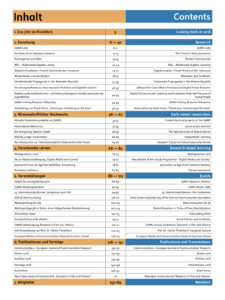
ZeMKI Research Report 2018
Editorial
Sometimes, things happen faster than you think. 2018 was such a year for the ZeMKI.
At the beginning of the year, our steering committee decided to submit an application to the Academic Senate (AS) of the University of Bremen for the ZeMKI to be recognized as a Central Research Unit (ZWE). Central research units are outstanding, interdisciplinary research institutions of the University of Bremen, which have a corresponding visibility both internally and externally and are evaluated at regular intervals. For a long time, the idea had been circulating around ZeMKI to take this significant step forward; now we decided to tackle it. We were expecting a process that would extend beyond 2019 and perhaps also to 2020. The opposite was the case: As soon as we presented the idea in autumn 2018, we received very positive feedback, were supposed to prepare the application by the end of 2018, and were then recognised by the AS of the University of Bremen in February 2019 with the support of the Dean’s Offices of the faculties 3 (Mathematics/Computer Science), 8 (Social Sciences), 9 (Cultural Studies) and 12 (Pedagogy and Educational Sciences), all of which are involved in ZeMKI. And now, here it is: ZWE ZeMKI, and we very much hope to be able to write more about what this change means in our research report next year.
A lot of other notable activities were carried out in 2018. First and foremost, Yannis Theocharis took up his professorship in “Communication and Media Studies with a focus on methodological innovation”. With great commitment, he has built up the ZeMKI Lab on “Computer-based Communication and Democracy” and sustainably strengthens the “Digital Methods in Context” priority area as well as our internationalization efforts. Yannis Theocharis was previously at the Dutch University of Groningen – and we are very happy that we were able to win him over to the University of Bremen and the ZeMKI.
Another reason why ZeMKI is becoming more and more international is our very successful ZeMKI Visiting Research Fellowship Program. Researchers from abroad with a doctoral degree can apply for a 4-week research stay at the ZeMKI. The only obligation is to do research on a self-chosen project during this time, to give a lecture and to publish a working paper. In 2018, the fellowships were granted for the second time – and again they met with great interest. Ten researchers from the following countries were selected from a total of 107 applications: Canada, France, India, the UK and the USA.
In addition, various new third-party-funded projects were launched at ZeMKI last year. These projects, together with those already underway, have made 2018 the year with the highest third-party funding in the 14-year history of ZeMKI. But they have also contributed to the fact that further doctoral students have started at ZeMKI, whom we all very warmly welcome. In addition to these new doctoral students, four completed their dissertations in the course of 2018: Dorothee Meinzer, Anne Mollen, Cindy Roitsch and Lisa Spanka.
In teaching, 2018 was a special year in that the MA Digital Media and Society was the first purely English-language master’s programme to be developed at ZeMKI. This was a great success right from the start: 148 students applied for the 24 places. Students from Africa, Asia, Europe, North America and South America are now enrolled in the programm – a truly international, highly motivated first “cohort” came together. And many of them – together with the students of our BA in Communication and Media Studies and our MA in Media Culture and Globalization – are already strengthening our various labs and projects as student staff.
The theme of the ZeMKI Conference 2018 – organized by the ZeMKI Labs “Audio-visual Media and Historiography” and “Film, Media Art and Popular Culture” – was “Research in Film and History: New Approaches, Debates and Projects”. The international conference was about discussing how documentaries, feature films, home movies, television programs and web videos influence our ideas of history. The conference was also the “kickoff” of the English-language Open Access Journal “Research in Film and History” published by Mara Fritzsche, Rasmus Greiner, Delia González de Reufels, Christine Rüffert and Winfried Pauleit at ZeMKI.
In addition to all these activities, we did a lot for our public relations work last year: the new ZeMKI website went online, we further developed our ZeMKI Media Talks (which are organized jointly with the Radio Bremen broadcasting channel Bremen Zwei) and we further profiled our social media activities (so you can follow us on Facebook and Twitter and keep up to date). We are also developing molo.news, a ZeMKI transfer project, as an experimental platform for local journalism and urban publicity in Bremen and the surrounding area.
One could report a lot more here, for example about the many important research projects and publications we have created, about various pending conferences and workshops. But the space in this foreword is limited. And rightly so: there is more space on the following pages to report in more detail on these activities at ZeMKI.
The ZeMKI Research Report 2018 is available here.


